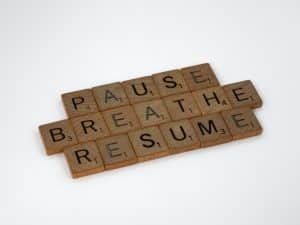
You’re getting it all the time, whether you realize it or not. Formally, and informally. Directly, indirectly, and 360 degrees. It’s a natural and necessary part of human interaction — and apparently, also professional existence.
Just because it’s everywhere doesn’t mean you’re paying attention to it, though. You may ignore it, dismiss it, or even deflect it. Or, you may let it seep through your skin and sink down deep inside you until you can’t see one inch past it.
Feedback. It’s in the little head nod from across the table that makes you believe your message is getting through. It’s in the compliment your roommate gives you on your outfit, or the way you make scrambled eggs, or alternatively, tells you to please wash your dishes for the ten-thousandth time.
It’s also in the notes your boss gives you on that first draft, on your quarterly sales numbers, and your end-of-year performance evaluation. It’s your mid-term exam grade, and the results of the class election. It’s in the number of likes and comments that post received, and the callbacks after the first round of recruiting.
It can lift you up, or knock you down. The extent to which it does either has a whole lot less to do with how it’s delivered than how it’s received.
Yes, I know, some people are really good at delivering feedback and other people, less so. And yes, I know, the intention behind how a message is offered matters. I also know that you can’t control any of those things. All you can control is how it’s received, and maybe more important, how it’s processed.
You’re not perfect. I assume you know this. Neither am I, by a long shot. We talk a lot around here about the “little voice in your head” that we all have that’s great at reminding us of that fact (but isn’t always telling the truth…there’s a difference). Somehow, hearing it from someone else can really feel like a punch in the gut, though.
I mean, you know you’re not perfect, but they see it, too? Damn. <<sigh>>
“Constructive” feedback can feel anything from uncomfortable to epically bad. It’s an ego hit, and no matter how “enlightened” you are, it still stings. But if you start with the premise that you aren’t perfect, then it shouldn’t be surprising that there are ways for you to improve. In fact, it’s kind of cool to know what some of those ways are. So you can, you know, change them, which will inevitably open up new ways for you to change further from there, and so on.
It’s a process, and it has a name. A few, actually. You can call it growth, evolution, transformation. Dealer’s choice. It’s you becoming more self-aware, refining and expanding your skillset, and making mistakes that don’t wipe you off the face of the earth. They make you stronger, smarter, and more resilient, actually, and they often result in “suggestions” about how to not make them again.
You’re always receiving information about “how it’s going,” all day every day. Some of it may be noise, but some of it may be really useful. Even more, not only does it tell you about yourself, it may tell you a bit about the person offering it. What do they notice, value, and absorb?
You’re only going to getting this super valuable information if you’re willing to listen, not only to the what’s coming in, but to your own internal response to it. What are the dominant feelings and storylines that arise when you receive information about yourself from someone else? Is there any truth to them? How do you want to respond, based on what you see?
Here’s the other important thing: You. Don’t. Have. To. Do. Everything. People. Say. You. Should. That’s a choice, though, and one you should only make mindfully.
Pay attention. Notice the details. Listen when others dedicate time to offering you ideas to support your growth. Let go of the idea that not being perfect equals not being worthy or valuable or capable, or anything less than whole.
Knowing you can change keeps the journey interesting. Don’t you think?
Photo credit: Markus Spiske




2 thoughts on “Opportunities for growth”
Well said and very thoughtful. I especially like what you had to say about the way we respond to other people. More importantly, no matter what the other person’s motivation might be – to help us or to tear us down – it doesn’t change our worth, value or capability as a person. So true!
Absolutely, Robin! Thanks for sharing your thoughts. 🙂